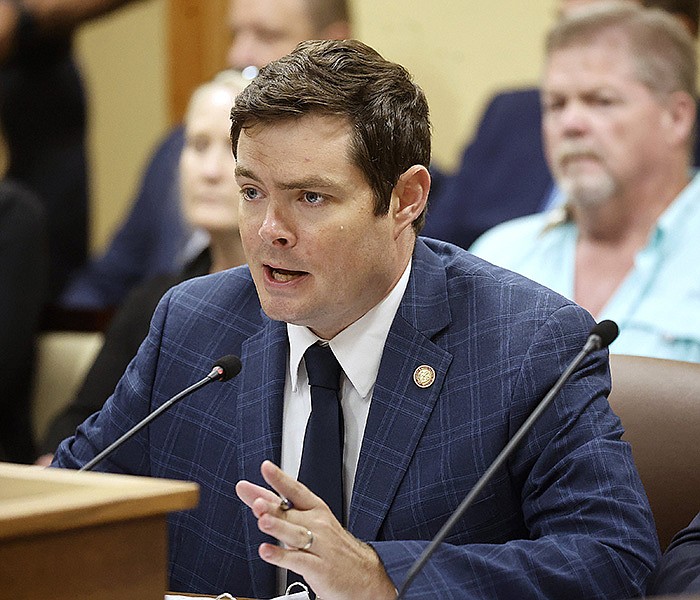The Arkansas Senate and the House State Agencies Committee approved bills Wednesday to exempt records related to the governor's security detail from disclosure, following overwhelming pushback from the public that pressured lawmakers into scaling down their attempts to overhaul Arkansas' open records and meetings law.
The bills, the third attempt by lawmakers to amend the Arkansas Freedom of Information Act, are a pared-down version of two previous attempts to amend the Arkansas Freedom of Information Act. But after public pressure Republican lawmakers and Republican Gov. Sarah Huckabee Sanders decided to forgo passing bills that would have greatly expanded the kinds of records that can be shielded from the public, instead sponsoring legislation supporters said would only conceal details about the governor's security detail.
The identical legislation, Senate Bill 10 and House Bill 1012, would exempt from the open-records law documents related to the governor's Arkansas State Police detail and "records that reflect the planning or provision of security services provided" to constitutional officers and judges, and would be retroactive to June 1, 2022.
The Senate approved SB10 in a 29-3 vote, with Republican Bryan King of Green Forrest and Democrats Greg Leding of Fayetteville and Fred Love of Mabelvale voting no. King, who was recorded as voting for the bill, submitted a letter shortly after the vote saying he had intended to vote against it. The bill moves to the House, which is scheduled to vote on it on today.
"Our current FOI law only exempts the security protocols and procedures, emergency plans, et cetera, related to the Governor's Mansion and the mansion grounds," said Rep. David Ray, R-Maumelle, sponsor of HB1012. "And it became evident a few weeks ago, I think for the first time to many people, that there were basically no other exemptions for the safety and executive protection of the governor and her family."
Sanders said the bill was necessary to protect her from death threats, saying security officials said disclosing aspects about her travel -- such as who flies on state planes with her -- could put her and her family in jeopardy. The bills also would require Arkansas State Police to submit a quarterly report to lawmakers detailing expenses related to the governor's protection detail.
"Our bill that protects security -- the most critical and important aspect of FOIA reform -- just passed out of the Senate with bipartisan support," Sanders posted after the Senate vote. "This is a great starting place for making our government safer and more effective, and I look forward to its final passage."
Afterward, Leding said he voted against SB10 because "I just don't understand why" it should be retroactive. "What we are trying to go back and cover up?" he asked. "I'm not sure I understand the need to protect security information from a year ago."
Leding said he generally comes down in favor of not weakening the Arkansas Freedom of Information Act in any way.
The Arkansas Press Association said it is "pleased this process has led to bills [HB1012 and SB10] that give our elected officials and their families a level of safety they deserve.
"We have stated we support reasonable safety provisions, and these bills offer that while also maintaining the strength of Arkansas' Freedom of Information Act."
Sen. Clarke Tucker, D-Little Rock, an opponent of prior bills to change the open-records law, opted to join Republicans in voting for SB10, saying, "I told my colleagues that if we had a security-only bill then I would vote for it, and I want to be a man of my word."
"If I were writing this bill, I would write it differently," Tucker said. "In my personal opinion I think it's probably a little bit broader than it should be. However, when it comes to the safety and security of the governor and her family, I think it's important to err on the side of their security."
At House and Senate hearings Wednesday, transparency advocate and Fort Smith attorney Joey McCutchen said the bill's retroactive clause gave the appearance the state was trying to hide something.
"I think we need to do our business in complete sunshine, no darkness," McCutchen said. "We don't even need to have the appearance of that."
Arkansas State Police Director Mike Hagar said the bill needed to be retroactive, as security plans for Sanders, whose immediate family includes five protectees, began months before Sanders won the election in November. Hagar noted that Sanders' opponent, Democrat Chris Jones, also has a young family who required similar security considerations.
"That's when planning and preparation began, knowing that our new governor, whether it be Dr. Jones or Gov. Sanders, our new governor has three small children," Hagar said.
Matt Campbell, an attorney and blogger whose request for records on the governor's state police protection prompted the bill, also remained against SB10, saying, "These bills are a 'solution' to a problem that doesn't exist."
In August, Campbell filed a request seeking records from Arkansas State Police on how much the agency spent protecting Sanders. Campbell has said he's received some records, including documentation showing state police hired private pilots to fly the governor, but he expanded his request to include documents on the state's airplane's flight manifest and passenger lists.
While Sanders said her reasoning for amending the state's sunshine law wasn't about "any one particular person," Hagar criticized Campbell in testimony Tuesday, saying the blogger was seeking records in hopes of embarrassing the governor.
"Not one person has shown how records currently available under the FOIA have created a single safety concern for the Governor," Campbell said in a statement. "Worse still, as written, these bills will exempt absolutely every record held by ASP that relates to any constitutional officer, including ASP personnel files, expenditures on ASP travel, and several other categories that present no safety concern to anyone."
FACING THE HEAT
Lawmakers are set to vote on and approve the scaled-down Freedom of Information Act bills today, ending a tumultuous four-day special session, House Majority Leader Marcus Richmond, R-Harvey, said.
The extraordinary session called by Sanders on Friday was meant to be a three-day affair where lawmakers would consider tax cuts and a ban on covid-19 vaccine mandates along with the overhaul to the Arkansas Freedom of Information Act.
But while the other items on the special session's agenda easily passed, Sanders' proposed changes to the state's open records law hit early resistance after legislators began receiving calls and messages from constituents urging them to vote no.
Richmond had hoped to pass a more expansive bill to amend the Freedom of Information Act, but recognized the pushback many members who signed on to the bill as co-sponsors received from constituents.
"My opinion is, the concerns were not so much about policy but political [things]," Richmond said. "You know this is going to have a negative impact out in the community, and I don't want to face that heat."
Before the House came into session Monday morning, Republicans held a caucus meeting where some voiced concerns about the bill, Richmond said.
"We knew from the start that this was a heavy lift, what we're being asked to do is a heavy lift," Richmond said. "I thought, you know, at some point we would be able to do it and hoped we could. But listening in the caucus to concerns, and legitimate concerns from, you know, their perspectives, every member, I thought, 'OK, this is going to be tough.' "
Announcing plans for the special session last Friday, Sanders was adamant the state's open records law was in need of a major update, saying disclosures about her travels on a state police plane could jeopardize her security.
Sanders also said the state's sunshine law made government inefficient, revealed the state's legal strategy in lawsuits and allowed attorneys to game the state through recouping legal fees in lawsuits under the 1967 law.
However, she received strong opposition from a coalition that included conservative media outlet Conduit News, the Republican committees of Pulaski and Saline counties, progressive activists, the Democratic Party of Arkansas and the Arkansas Public Policy Panel, a social and economic justice advocacy group.
"I will say the dynamics of the far-right and the far-left coming together in unity was just really spectacular," said Rep. Julie Mayberry, R-Hensley. "I have never seen anything like that."
The first bill to amend Arkansas' Freedom of Information Act included a "deliberative process" exemption that would have protected records "that comprise part of the process by which governmental decisions and policies are formulated" from disclosure. However, after the initial pushback, lawmakers filed a new bill that instead called for shielding "records reflecting communications between the Governor or his or her staff and the secretary of a cabinet-level department" from the public view.
The bills also would have made it harder for those who file suit against local governments under the Freedom of Information Act to recoup legal fees, something that critics said would hurt those who couldn't afford attorneys otherwise.
Sanders said the bills were necessary to facilitate government efficacy, claiming activists have weaponized the state's Freedom of Information Act to slow her agenda. But after a five-hour hearing Tuesday during which most spoke passionately against the bill, Republican leaders backed down and presented the latest bill that only addresses the governor's security concerns.
The previous version proposed exempting records "prepared by an attorney" representing a state official or agency that could be used in pending litigation or "anticipated in light of a plausible threat of litigation," something Sanders said was necessary so opposing attorneys could not access the state's legal strategy before discovery.
The first sign of trouble for the first bill to amend the Freedom of Information Act came Monday morning when multiple attempts to suspend some rules that would have sped up the lawmaking process in the the Arkansas House of Representatives failed.
"I was shocked," Mayberry said of the House voting down multiple proposals to suspend the rules. "I was planning on saying no because I'm tired of things being rushed."
Mayberry said some of the frustration was over how the session ended in April, as the House suspended rules so it could quickly pass dozens of bills. Mayberry attempted a compromise bill, similar to the one now backed by Sanders, which cut everything in the previous bill except for the provision on security and also would have not been retroactive, a hang-up for some lawmakers.
Richmond said the fight isn't over, as lawmakers will again take up the issue in the next regular session in 2025 or even before. Senate President Pro Tempore Bart Hester, R-Cave Springs, said a working group formed by Attorney General Tim Griffin will examine proposed changes to the Freedom of Information Act.
"The process worked," Richmond said. "Legislators listened to the folks and made decisions on the feedback they were getting from their constituents."
Information for this article was contributed by Michael R. Wickline of the Arkansas Democrat-Gazette.
CORRECTION: A previous version of this article incorrectly listed the final vote count of Senate Bill 10.
 Sen. Bryan King (left), R-Green Forest, questions Sen. Bart Hester, R-Cave Springs, during discussion of Senate Bill 10, which would amend the state’s Freedom of Information Act, during the House Committee on State Agencies and Governmental Affairs meeting on Wednesday at the state Capitol in Little Rock. (Arkansas Democrat-Gazette/Thomas Metthe)
Sen. Bryan King (left), R-Green Forest, questions Sen. Bart Hester, R-Cave Springs, during discussion of Senate Bill 10, which would amend the state’s Freedom of Information Act, during the House Committee on State Agencies and Governmental Affairs meeting on Wednesday at the state Capitol in Little Rock. (Arkansas Democrat-Gazette/Thomas Metthe) Allison Bragg, secretary of the state Department of Inspector General, and Arkansas State Police Col. Mike Hagar take questions from Sen. Bryan King (bottom), R-Green Forest, about Senate Bill 10, which would amend the state Freedom of Information Act, during the House Committee on State Agencies and Governmental Affairs meeting on Wednesday at the state Capitol in Little Rock. (Arkansas Democrat-Gazette/Thomas Metthe)
Allison Bragg, secretary of the state Department of Inspector General, and Arkansas State Police Col. Mike Hagar take questions from Sen. Bryan King (bottom), R-Green Forest, about Senate Bill 10, which would amend the state Freedom of Information Act, during the House Committee on State Agencies and Governmental Affairs meeting on Wednesday at the state Capitol in Little Rock. (Arkansas Democrat-Gazette/Thomas Metthe)